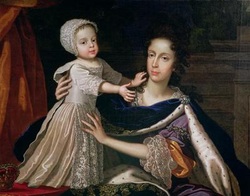 The original rock-a-bye baby Why is my five-year old speaking caustically about the French Revolution? How is he able to make critical remarks about England's Glorious Revolution? I mean, he's brilliant and all (I joke!) but really! How does he know about such things? Well, the short answer is, he doesn't. He's just chanting words many of us learned when we were kids, about Jack and Jill and babies rocking in tree tops. Mother Goose Rhymes? Nope, try re-appropriated tavern songs and ballads. (Similar to "Ring-Around-the-Rosy's" dismal connection to the Bubonic Plague and the Danse Macabre. I'd have talked about that, but that's old hat! Old hat?) Next time you're humming that old tavern tale, er, nursery rhyme "Rock-a-bye baby," imagine the real context. It's 1688. Protestant England is being ruled by James II. Despite the King's overt Catholic tendencies, Parliament and the people are generally fine with their ruler. After all, in due time, his daughter Mary--married to William of Orange, a good Protestant--would inherit the throne. But when rumors start to spread that the Queen had secretly borne a male heir--or stolen a child, smuggled into England in a warming pan, if you can believe THAT!-- a child who would surely return the country to Catholicism, the people rebelled. They overthrew James II, cast off the baby, and gave the throne to Mary to rule jointly with her husband. So how is all this revealed in the most everyday of songs? Check it out! "Rock-a-bye, baby" (the warming pan baby, James III) "On the tree tops" (I think the tree represents the English monarchy) "When the wind blows" (the Protestant wind blowing in from the Netherlands, with William and Mary) "The cradle will rock." (The cradle is the monarchy being rocked). "When the bough breaks," (Again, the tree) "The cradle will fall, and down will fall baby, cradle and all." (The End of the English monarchy!! Huzzah!) A whole different perspective, right? But the other story--Jack and Jill--tells a much more bloody tale. Well, okay, some say "Jack and Jill" is referring to the economic downturn in early seventeenth century England. In this version, Charles I commanded that the volume of a 'Jack" (1/2 pint) be lowered because it was too costly ("broke the crown"), and the "Jill" (or gill, 1/4 pint) came tumbling after. But that's less fun. I like the version that ascribes the nursery rhyme's origins to the French Revolution. Very simply: "Jack and Jill" (the luckless King Louis XVI and his wife, the much maligned Marie Antoinette) "Went up the hill" (They mounted the scaffold in 1793. You see where I'm going here?) "To fetch a pail of water." (Okay, not sure about this line! any thoughts?) "Jack came down, and broke his crown," (Executed by the slicing dicing guillotine) "And Jill came tumbling after." (Marie Antoinette executed a few months later. That guillotine was awfully efficient. But again, the end of a monarchy.) What do you think? Fun stuff, right?
13 Comments
When I teach history, I always ask my students to view every "fact" as relative and subject to interpretation. Inevitably, someone will ask: "Well, what about dates? Those are facts." But dating and calendar systems vary widely, and may not be consistent across different groups of people.
I've been thinking about this recently as I struggled with the timeline of my own novel. Monster at the Gate begins a few months before the plague struck London in the 1660s. I start the novel on Shrovetuesday in February 1665 (a crazy strange day before Lent) and end with the Fire of London the following year (September 1666). Two clear beginning and ending dates, spanning about nineteenth months in total. Easy enough? NO! As I was writing, I kept running into odd inconsistencies with the historical records I was using (such as Pepys' Diary), trying to double-check details. I kept finding that Tuesdays should have been Sundays, or that Easter had occurred at a different time than I expected. I knew that historical records would say 1664/1665 or 1665/1666, but I couldn't remember the exact details of how contemporaries kept time. (MUCH GNASHING OF TEETH!!!!) Finally, I sorted it out. England was still on the Julian Calendar (which had been adjusted for a missing ten days), rather than moving to the Gregorian Calendar used by most of Europe (it did not reform its calendar until 1752). To make it even more confusing, the Julian Calendar year starts on March 26, not January 1. But luckily I found a historic date calculator to help me keep it all straight. So, my book technically starts on Feb 7 1664, and ends September 3, 1666, and that's still only nineteenth months. You do the math! But I'm wondering if it will confuse my readers if they think the book is starting in 1664, when by today's modern calendar, it would actually be 1665. What do you think? |
Susanna CalkinsHistorian. Mystery writer. Researcher. Teacher. Occasional blogger. Categories
All
Archives
May 2023
|
 RSS Feed
RSS Feed